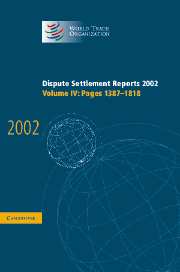Book contents
- Frontmatter
- Contents
- United States – Anti-Dumping Measures on Certain Hot-Rolled Steel Products from Japan (WT/DS184): Award of the Arbitrator under Article 21.3(c) of the DSU
- United States – Definitive Safeguard Measures on Imports of Circular Welded Carbon Quality Line Pipe from Korea (WT/DS202): Report of the Appellate Body
- United States – Definitive Safeguard Measures on Imports of Circular Welded Carbon Quality Line Pipe from Korea (WT/DS202): Report of the Panel
- Cumulative Index of Published Disputes
United States – Definitive Safeguard Measures on Imports of Circular Welded Carbon Quality Line Pipe from Korea (WT/DS202): Report of the Appellate Body
Published online by Cambridge University Press: 13 December 2017
- Frontmatter
- Contents
- United States – Anti-Dumping Measures on Certain Hot-Rolled Steel Products from Japan (WT/DS184): Award of the Arbitrator under Article 21.3(c) of the DSU
- United States – Definitive Safeguard Measures on Imports of Circular Welded Carbon Quality Line Pipe from Korea (WT/DS202): Report of the Appellate Body
- United States – Definitive Safeguard Measures on Imports of Circular Welded Carbon Quality Line Pipe from Korea (WT/DS202): Report of the Panel
- Cumulative Index of Published Disputes
Summary
INTRODUCTION AND FACTUAL BACKGROUND
The United States and Korea appeal from certain issues of law and legal interpretations in the Panel Report, United States – Definitive Safeguard Measures on Imports of Circular Welded Carbon Quality Line Pipe from Korea (the “Panel Report”).
The dispute concerns the imposition of a definitive safeguard measure by the United States on imports of circular welded carbon quality line pipe (“line pipe”). This measure was imposed following an investigation conducted by the United States International Trade Commission (the “USITC”), a body comprised of six Commissioners that is charged with conducting such investigations under United States law. On 29 July 1999, the USITC initiated the safeguard investigation into imports of line pipe. The USITC finally determined that “circular welded carbon quality line pipe … is being imported into the United States in such increased quantities as to be a substantial cause of serious injury or the threat of serious injury”. Three Commissioners made a finding of serious injury. Two Commissioners made a finding of threat of serious injury. The affirmative vote of these five Commissioners constituted the majority supporting the “affirmative determination” of the USITC. A single Commissioner made a negative determination that there was neither serious injury nor threat of serious injury. The views of that Commissioner are not part of the USITC determination. In the light of these findings, the USITC determined that “line pipe … is … a substantial cause of serious injury or the threat of serious injury”.
In its investigation, the USITC identified a number of factors, apart from increased imports, which had caused serious injury or threat of serious injury to the domestic line pipe industry. However, the USITC concluded that increased imports were “a cause which is important and not less than any other cause” and that, therefore, the statutory requirement of “substantial cause” was met. On 8 November 1999, the United States notified the Committee on Safeguards, pursuant to Article 12.1(b) of the Agreement on Safeguards, that the USITC had reached an affirmative finding of serious injury or threat thereof caused by increased imports.
- Type
- Chapter
- Information
- Dispute Settlement Reports 2002 , pp. 1403 - 1472Publisher: Cambridge University PressPrint publication year: 2005

